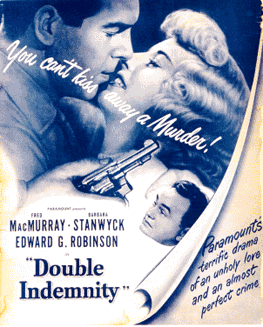 Well, where to
start. Classic noir and neo-noir, on the
surface, seem to evoke the same message of cultural and social anxiety relevant
to their respective timeframes. They do
this through the mediums of fatalism, pessimism, obfuscation, and upheaval of
specific gender roles. Add to this the
usual expressionistic styles; dark, gloomy, depressive atmospheres, and let’s
not forget the classic “crime doesn’t pay attitude. With all of that, we get the classic
definition of film noir, yet neo-noir does most of this, yet so much
more.
Well, where to
start. Classic noir and neo-noir, on the
surface, seem to evoke the same message of cultural and social anxiety relevant
to their respective timeframes. They do
this through the mediums of fatalism, pessimism, obfuscation, and upheaval of
specific gender roles. Add to this the
usual expressionistic styles; dark, gloomy, depressive atmospheres, and let’s
not forget the classic “crime doesn’t pay attitude. With all of that, we get the classic
definition of film noir, yet neo-noir does most of this, yet so much
more.
First, let’s take a
brief look at classic noir. Generally a male protagonist whom is usually
fairly ambiguous, a sultry and seductive femme
fatale, a strong and willful detective (who can be the protagonist, he
usually, however, loses he strong and willful nature when interacting with our femme fatale), and a dark and shocking
crime. Add all of that together with a dark
monotone world full of shadows and gloom and you have some of the
quintessential noir films described
in a nutshell. They may deviate from one
or two of the usual aspects, however the overall feel is still very much noir.
Now, let’s take a look
at neo-noir. Gone (usually) are the dark monotone landscapes,
now replaced with vibrant and colorful high-definition; gone (usually) is the
crime doesn’t pay attitude, now replaced with a “take all you can and give
nothing back” attitude; yet we still see parallels that equate the new school
with the old school. While sometimes the
visual aspect isn’t dark, the social aspect more than makes up for it making
the film still dark and gloomy. With the
loss of society’s perceived innocence, we gained darker and grittier stories to
accompany us. Gone are the ambiguous
sexual innuendos and the minor, yet still shocking for the times, violent
actions. Now we have blatant sexual
themes and overt over-the-top violent actions.
Sometimes these elements are even intertwined for an orgy of the senses,
perhaps showing how desensitized we as a society have become that we need the over-the-top
to connect to these films at all.
Sometimes we lose the overall ambiguous protagonist, in place of a
cocksure and strongly moral hero. I’ve
used the term “moral” somewhat loosely, as our hero’s morals may or may not
conform to society’s morals, which is still a staple of noir. Sometimes our
protagonist fulfills the role of the femme
fatale, a role traditionally left to an antagonist. Overall, neo-noir
takes the roles and conventions of classic noir
to new extremes in a more a la carte
style. Perhaps we have only a couple
aspects in neo-noir film that can be paralleled
to its classic counterpart, but that is okay.
Noir has always been tricky to
define, and nothing has changed about that, the overall definition has just
broadened a bit.
After all is said and
done we still have dark films sharing society’s anxieties in expressionistic
ways. The overall essence that defines noir is still very much prevalent and
alive, however, the films, as well as the audience, has changed with the times.

Keith,
ReplyDeleteI like your perspective. I like that in your post, it seems like you’re making the point, that neo-noir is still noir and that they aren’t two completely different genres. But yet you still showed the difference between the two. I also like how you describe classic noir in general; how you go into some of the particulars of each character type, such as the detective/protagonist and also the femme fatale. And I agree with your statement they “evoke the same message of cultural and social anxiety.” I think it pretty well sums it up. Good job, I enjoyed the read!